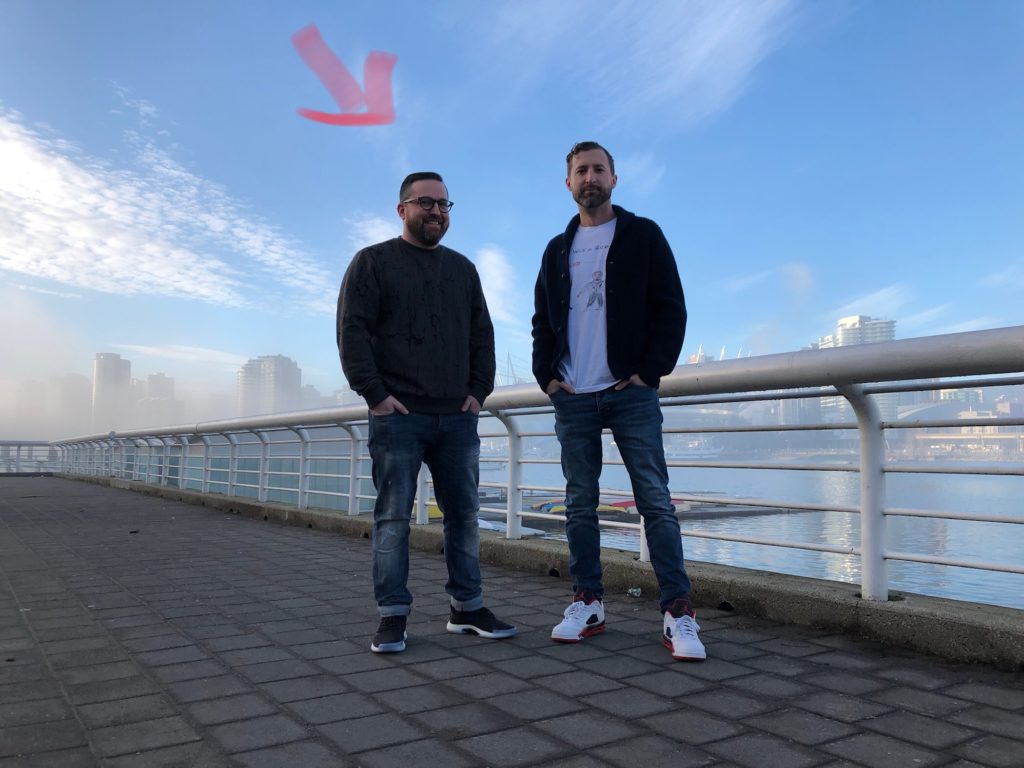
Vancouver Based Writing Team, Matt Venables and Jeremy Smith
Matt Venables took a break from prepping Van Helsing season 4 last week to join the Scripted Series Lab for lunch. We were very eager to ply him with questions, as well as mac and cheese!
You work as part of a writing team with Jeremy Smith. What are the pros and cons of working as a team?
The cons? You split the money. We’re not greedy guys so it’s not really a con for us. The pros? It’s a mini writers’ room! We’ve always got each other to bounce ideas off with. We’re always pushing each other, building off each other. Being in a team taught us a lot about being in a writers’ room before we were really in a room because we learned not to be precious about everything we write. Be passionate, but not precious.
How do you and Jeremy complement each other as writers?
We joke that I build the foundation and then he finishes the house. I put in a lot of the structure. He almost always does the final pass. Apple TV changed the way we wrote because now we can put a script on a screen now and go through it together, screen by screen, line by line. If there’s something one of us wants to change, we highlight it.
How do you get your voices to match throughout a script?
Again, Apple TV! We go through the script together. Also, the final pass, which is usually Jeremy, ensures that voice issues get smoothed out. He sends it to me after the final pass, and if there’s something I want to adjust, we can do that. We don’t like to use email for this because that can get in the way of the communication.
What are some of the struggles you two have had together with ego?
We haven’t really had ego issues. Sometimes one of us will be really into an idea and the other person just isn’t feeling it. I pitched Jeremy an idea for a comedy and he didn’t want to do it. I think I wasn’t doing a good job of explaining it. I finally just wrote a draft so he could read it, and then he was like, “oh yeah!” and he got into it.
How do you guys sort out doing a pitch?
I’ll start with the back story of why the project is important to us, then he’ll take the lead from there. Jeremy likes to talk more than I do. I’ll interject once and a while.
Do you have any advice for those first early days in a writers’ room?
If you can get in as a writer, awesome, do it. I’m big on doing script coordinating first though. I think it teaches you a lot about the job, and what it takes to be a story editor and the whole script process for production. It’s a lot of work. If you don’t know what a script coordinator does and you’re a story editor, you’re probably leaning on the coordinator too much. It’s invaluable to have done that job.
Also, I would say be persistent. It’s a long road. For us, it took twelve to fifteen years. Rooms in Vancouver were so rare, and we were also finding our voice. We were lucky, and we were prepared when we got the opportunity.
Everything you learn, in any position, that helps you understand how the machine works, is going to be useful. We both worked as office PA’s. I’ve worked as a locations PA, I’ve collected garbage on set…to me it’s all relevant knowledge. You’re better for it in the long run if you know how the machine works because you can catch problems before they fall through the cracks. As a showrunner, that’s invaluable. The little things add up, so fix everything in prep. For that, you need to know how it all works.
What’s Your Advice for Getting yourself on the list of script coordinators who get an interview?
Ink drinks is a good place to meet other writers. It’s a great community. Get a job in the industry however you can, then start making those connections. I got my first opportunity as a script coordinator because a producer I had worked for, (as a Producer’s Assistant,) knew I wanted to be a writer. She gave me the heads up about a room that would be starting up, and that got me an interview.
It’s about putting yourself out there and making connections.
Now that you and Jeremy are developing more of your own stuff, what’s your process for developing new material?
It’s pretty much the same as in any writers’ room. We do a lot of talking, and we have corkboards in our houses. We card everything.
What’s your advice for creating good pitch material?
I would google “successful pitch document.” Try to show the tone of the show. Have a firm understanding of your characters. Be concise in what your story is. It’s hard, so be passionate about your material! Also, you’re selling yourself as much as you’re selling the project.